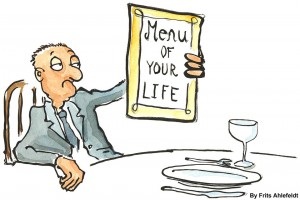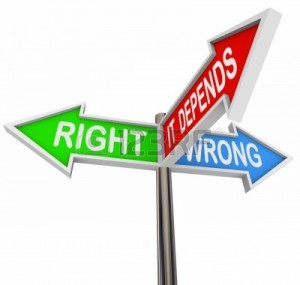[This was first posted on April 19, 2012, a timely reminder from the Giver of Life.
Just think: we have to be alive to be able to ‘choose life’ . . . so what does the LORD of LIFE mean by that?
In searching for a suitable image for this article, one showed Moses speaking to the 2nd generation born from the original generation referred to as ‘mixed multitude’ of Israelites and non-Israelites who first stood on Sinai 50 days after leaving Egypt. This 2nd generation plus two surviving from the 1st, Joshua and Caleb, were being addressed for the last time by about-to-die Moses who was reminding them of everything spoken by the God who made a covenant with their parents, the stipulations of which automatically applied to generations belonging to their newly formed nation of Israel. By this time, they were no longer a “mixed multitude” but all Israelites, for the non-Israelites among them would have been assimilated or eliminated in death resulting from the judgment of God upon the disobedient stiff-necked 1st generation. That image would have been the one posted except for one problem: the quote from Deuteronomy “choose life” was attributed to Moses. Well, what’s the fuss, didn’t Moses say it? Yes, but let us not forget Moses was merely a mouthpiece of his God, not the originator of the Torah. We keep reiterating, it is wrong to say “the Law of Moses” or “the Torah of Moses,” no, No, NO! Moses is NOT the Law-giver, Moses did not originate the Torah; for if Moses made it all up by himself then one major world religion could indeed claim that Torah is only for the Jews and not for Gentiles. YHWH the Creator and Revelator on Sinai is the LAWGIVER, the Giver of TORAH and He intended His manual for living, guidelines for life to regulate everyone made in His Image, that is all of humanity. The Torah is the LAW of YHWH, the LAW-GIVER! When will all of humanity in whatever religion they’re in ‘get it’? —Admin 1].
————————-
In a previous article — The Tree of Life is the Torah -2 — the phrase “Choose Life!” was introduced and left hanging, so to speak. This article picks up where it left off.
Much of the material here is from an excellent article written by Rabbi David Rosenfeld in his series on http://www.torah.org/learning/mlife/LOR5-3.html
Rabbi Rosenfeld explains that free will is fundamentally a pillar of the Torah. Every human being since Adam and Eve has been given this gift which carries a tremendous responsibility. Of all of God’s creatures, including angelic beings, only man is given the privilege to make a choice.
Now making a choice would require that a minimum of two options are available; otherwise, there is no choice, and freedom of the will is useless and one cannot be held responsible for making the one and only choice given the limitation—although if you REALLY think about that one, having only one choice, you do have another choice—-not to choose that one and only option, get it? Because even with only one to choose from, your freedom to choose gives you the right to refuse choosing the one and only one available. So freedom is still yours to exercise if you so wish, only that you don’t have more than one to exercise it on. Is this getting confusing? Freedom is yours, option is limited; that does not strip away your freedom. As our illustration shows: RIGHT/WRONG and a third is “It depends.” On what? One’s decision to exercise his freedom. But before we lose the focus of this article . . . .
Thank YHWH that in His foresight and wisdom, He made sure that man is not left ignorant of choices available to him during his lifetime in anything relating to what the Creator of man desires for His one and only creation endowed with free will. Man knows that once he is born and is a living being, his fate at any point is—- death, the end of life, the absence of life. So since he has no choice regarding his ultimate destiny, what choice does he have except to live?
Deuteronomy 30:15,19:
See, I have placed before you today life and good, death and evil . . . [and you shall choose life].
Deuteronomy 11:26:
And it is written, ‘See, I place before you blessings and curses.”
Rabbi Rosenfeld explains,
“free will is in your hands and anything a person will desire to do of the acts of man he may do, whether good or evil. Because of this matter it is stated, ‘Who would make it that they would [always] have this heart of theirs (that they currently have) [to fear me and to observe all my commandments all the days]’ (ibid. 5:26). This means that the Creator does not force people nor decree upon them to do good or evil. Rather their hearts are in their own hands (lit., ‘are given to them’).”
He then explains Rambam’s perspective:
“There is no predestination. Man is free to to choose his actions and his fate, and to become as great or as evil as he wishes. And since it is in our ability to choose, G-d can command us to act properly — and punish us if we do not. Finally, since our actions are our own responsibility, it is up to us to repent our mistakes. We cannot blame anyone else for our failings — even if all sorts of outside factors did in honesty influence us for the better or worse. Ultimately, our decisions were our own; only we will stand judgment for them.”
Rambam backs up this same principle with key Scriptural verses, says Rosenfeld:
“In Deuteronomy 30 G-d offers us the choice: good or evil, life or death. The two paths of life are laid out before us. G-d tells us the score,
He ‘urges us’ to follow the path of good,
He ‘wishes’ that we would,
but He does not and cannot force us.
“For the world would be pointless if man had no choice, if we were just following some pre-written script without any say of our own. G-d had to leave our fates up to us. He presents us with the facts and tells us which path He would ‘like us’ to traverse, but beyond that we are left on our own.”
In explaining the language of the first verse quoted, [I have placed before you today life and good, death and evil.”] he notes how striking is the point made:
“The choice is not just one of good versus evil. It is life versus death. . . .that by choosing good one earns life and vice versa. But why are life and death mentioned before good and evil? Aren’t they simply the consequences?”
Rosenfeld further explains how profound is the thought presented by Rambam:
“Choosing good is not just a matter of making good choices and earning reward. It is being alive. If we just follow our natural inclinations — if we just more or less follow the script — even if to some degree we were given good programming by our parents or environment, we are not really “alive”. We are just passive, allowing ourselves to be drawn wherever the outside world leads us. Perhaps an obedient horse we are, but such is not truly life in a spiritual sense.”
“When the Torah instructs us to choose life, the meaning is not simply that we behave. It means that we be alive — that we live with awareness. We must understand the gravity of life and recognize the significance of our actions. And however we decide to live, it must be a conscious decision. ‘We’ took control and made our decision. We exercised our lives and vitality. We understood what life is all about and did something about it. Passivity — even more or less good passivity — is not life. Taking control of our fates — understanding the stakes of life and doing something about it — is what life really is.”
He gives an example of how we are somehow programmed as children to do what we are told; gives a sample of a Jewish child who grows up in a religious environment and therefore follows the kosher diet, observes the Sabbath, goes to the synagogue with his parents, prepares for his Bar Mitzvah, etc. While he has been following what he has been told, everything he has done so far was imposed upon him in his upbringing by his family environment.
The question is:
In the process, did he make any decision for himself, to grow closer to God, or was it routine obedience?
Was there any inner conviction as he grew older and matured to do what is right?
Rosenfeld makes a point that doing right, whether of one’s volition or not, is a good thing, has positive effects on the person; at least physically, a kosher diet makes one healthy, etc. But the testing comes when the child is exposed to negative influence.
Rosenfeld continues:
“Rather, true life is taking control — knowing the stakes of life, recognizing the challenges, and taking a stand. I’m alive when ‘I’ do something, when ‘I’ make a decision. The Torah does not exhort us to choose good but to choose life. Serve Me as a reflection of your inner conviction — because you wanted to, not because you allow yourself to be drawn in some positive direction when the winds happen to be blowing favorably.”
“Conversely, a person who sins is not merely doing bad actions. He’s choosing death — and not only as a consequence of his poor choices. He’s consciously choosing to pursue an illusion — the empty enjoyment of the pleasures of this world — as if there is anything of true worth other than following G-d. And this is not merely wrong. It is failing to live. It is allowing oneself to be drawn after whatever excites his fancy. It is living passively; being acted upon by the world at large and whatever it has to offer. It is not taking a stand and choosing, not truly waking up to what life is all about. It is not being alive.”
Rosenfeld then gives an example of 2 converts to faith in the God of Israel in the book of Ruth. Naomi’s daughters-in-law –Ruth and Orpah — both were willing to return with Naomi to Bethlehem. In Naomi’s efforts to discourage them, Ruth insisted on going with Naomi while Orpah was persuaded to return to her people.
His conclusion:
“This, to wrap up, is the theme of the Rambam this week. Choosing, exercising our free will, is not about obeying G-d’s will. It is about being alive. What makes us alive, what give us life and vitality is consciously deciding. It is contemplation, recognizing the significance of life and determining just which path we want to take. And such can make us great — or terrible if we decide wrong. But just letting ourselves be drawn after whatever piques our interest, whatever our friends are doing, or whatever our elders tell us is not truly living. It is as a horse being driven by its rider. Only when we take out and grab the reins are we truly alive.”
NSB@S6K




